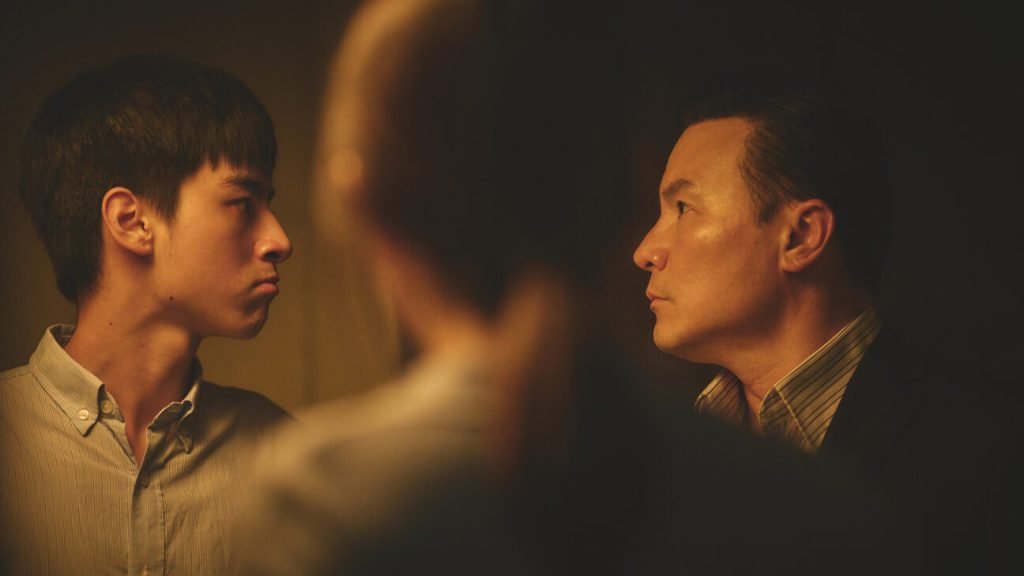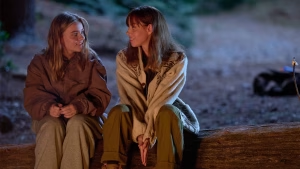In 2019, Taiwan became the first country in Asia to federally recognise same-sex marriage, even though policy around marriage equality rights for couples. With this, Taiwanese filmmaker Julian Chou points to a persisting attitude toward queer individuals, where they are forced into secrecy or otherwise ostracised if they choose to be out. She takes this pervasive environment as the basis for her sophomore feature, Blind Love (2025, 失明), which just world premiered in the Tiger Competition of the 2025 International Film Festival Rotterdam.
We first enter the world of Blind Love through the eyes of high schooler Han (Jimmy Liu)—eyes being the operative word as a motif throughout Chou’s newest work. Han is perhaps an accessible character for many audiences: the classic archetype of a teenage boy burdened by immense family pressures for his future and filial demands for piety, all while experiencing teenage desires that come into conflict with the demands of the social structure in which he lives. But he’s only one part of a secret love triangle that emerges between himself, his mother, and a woman from her past that becomes the core of Chou’s feature—and his mother, Shu-yi (Ariel Lin), ultimately becomes its central protagonist.
Shu-yi’s family life is fraught, burdened by her dismissive, ignorant, and conservative surgeon husband Feng (Frederick Lee), who’d rather spend time with his patients than with his wife and children. Effectively bordering on abusive, he objectifies them all and treats them like his playthings; to him, what Han does with his life is only to help further his father’s career, while he acts like he controls his wife’s body. She’s pressured to feel anorexic, stuck in a toxic marriage with no way out—and yet, 15 minutes in, she is mysteriously kissed by a confident, attractive woman in a bathroom. Soon they meet again: the woman is an eye doctor—and, fascinatingly, an amateur boudoir photographer by night—named Xue-jin (Ke-Xi Wu), and not a stranger, after all, but someone from her past.
Chou’s universe is a not-yet-liberated one, taking place also before Taiwan’s marriage equality policy. It’s a world where queer women provide an outlet from loveless, controlling relationships, and young women are still figuring out whether their boyfriends have assaulted them or not (spoiler: they have), stuck in a heteropatriarchal mindset. From here, we see two sides of Xue-jin, which she code-switches between: the soft, compassionate side with men and the flirty, conventionally seductive side with men. Openly queer and vaguely tomboyish, she recently went through a bitter divorce and, now single, eagerly flirts with both men and women. Initially, she comes off as predatory toward Han’s and Shu-yi’s source of desire, but over the course of the film, it becomes clear that she is battling a multitude of odds stacked against her.
At least in Blind Love, sapphic desire is multifaceted and complex, like in real life. On one hand, it’s deeply beautiful—bodies are entangled elegantly as light streams in through windows, murky and opaque. On the other hand, it’s hungry and raw, caught through streams of desperate sobs and frantic corporeal movements. Chou has a strong grasp of creating atmosphere: the first outdoor shot of Taipei we see feels genuinely lush and inviting, and the film’s overall visuals bathed in warm greens and reds. Blind Love is thus a success by Chou as carried by its visuals, even though its screenplay by River Wu (based on an award-winning original short story by Essay Liu) struggles to find its footing.

The length and breadth of the script are what hold the film back the most, and its hefty 140-minute runtime prevents the concision it needs to land fully. The story, which is perhaps intentionally unfocused and oscillating between multiple characters’ perspectives, would perhaps better function well as an episodic work, given the build-up that Chou uses to affirm some of the story’s narrative peaks. Similarly, it is often hard to gain a strong sense of each character’s interiority as we dwell with each one for such little cumulative time, despite the film’s length. The narrative choice for Xue-jin to engage with both Han and Shu-yi (without the other knowing) further makes the film’s story mildly unsettling and often unrealistic at points. The repeated narrative motif of eyes—itchy eyes, a blind grandmother, Xue-jin’s profession, the title, and so on—likewise feels symbolically overstated, while its subtler elements are more effective.
The filmmaker’s greatest success is thus portraying the stifling Taiwanese upper-middle-class environment, simultaneously economically privileged while encountering self-enforced social norms that make the milieu quite conservative and by-the-book. Intersecting this space is an emergent queerness that lingers in Gen X adults and young millennials. She depicts not young people who come into the world out and proud, but instead a generation of adults still young while Taiwan was still under martial law (until 1987), growing up through the country’s democratisation process and drastic sociopolitical changes.
Chou litters the film with suggestions of the open queerness that is to come in younger generations of Taiwanese people: we initially see a rainbow stuffed animal floating in the background of a frame, while Han’s younger brother, Rui, happily draws a picture of a rainbow. The film’s final scenes contrast direct patriarchal violence with more socially acceptable methods of heteronormative oppression in Taiwanese society today: shaming queer couples for being affectionate in public, for instance. In doing so, Chou points to slow but steady progress, and perhaps the hope for not merely tolerance, but acceptance and embrace.





